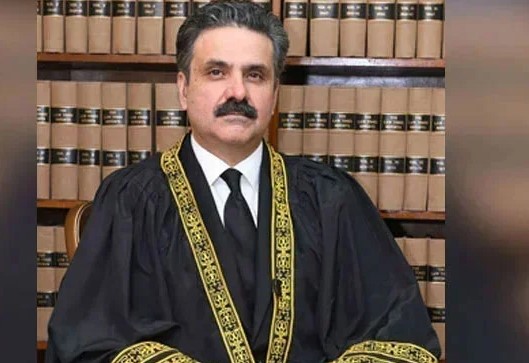1. Chief Justice Afridi
On October 26, 2024, Justice Yahya Afridi, who was previously nominated by the Special Parliamentary Committee (SPC), would take the oath of office as the Chief Justice of Pakistan (CJP). After the incumbent Chief Justice of Pakistan, Qazi Faez Isa, retired on October 25, his appointment represents a turning point in the country’s judicial history. In addition to highlighting Afridi’s illustrious legal career, this nomination also represents a more significant change in Pakistan’s judicial appointment procedure brought about by the 26th Amendment to the Constitution.
2. Justice Yahya Afridi Selection
The President of Pakistan chose the seniormost Supreme Court judge prior to the 26th Amendment, which made the appointment of the Chief Justice a simple procedure. For many years, this approach based on seniority had been the standard. A more inclusive procedure implemented, nevertheless, with the most recent change, and the Chief Justice now chosen based on the Special Parliamentary Committee’s (SPC) proposal. A more equitable approach to judicial selections is ensured by this committee, which chooses the CJP from among the Supreme Court’s top three most senior judges.
The SPC’s discussions resulted in the eventual appointment of Justice Yahya Afridi. Among the eligible Supreme Court judges, Afridi is the third most senior. He was selected above Justices Mansoor Ali Shah and Munib Akhtar, who were also thought of for the role. Since the SPC’s ruling establishes a more open and democratic process for selecting the highest court, it marks a substantial shift from the previous system.
3. SPC Formation
One of the most significant effects of the 26th Amendment is the creation of the SPC. Eight members of the National Assembly (MNAs) and four senators make up the committee, which met for the first time in Pakistani history and was established by Ayaz Sadiq, the speaker of the National Assembly. Both the opposition parties and the ruling government were represented by these MPs, who were chosen by their respective legislative leaders. This arrangement guarantees that a wider political agreement is reflected in the process.
a.Tehreek -e-Insaf (PTI)
But this new arrangement was not embraced by all political groups. By refusing to attend the SPC sessions, the Pakistan Tehreek-e-Insaf (PTI) and its partner, the Sunni Ittehad Council (SIC), demonstrated against the constitutional modifications that created the committee. In spite of this resistance, the SPC proceeded with its discussions. While just one member, JUI-F Senator Kamran Murtaza, voted in favor of Justice Mansoor Ali Shah, the other eight members who were present during the pivotal vote supported Justice Yahya Afridi.
b.Judicial Appointment Transparency
The PTI and SIC were not included in the process, but it didn’t stop the SPC from acting fairly and transparently. Both legal experts and political leaders have praised the committee’s judgment for upholding democratic values and the rule of law. The SPC’s engagement in Justice Afridi’s selection highlights the value of legislative participation in judicial appointments and shows a move towards more participatory governance.
4. President’s Authority and Constitutional Power
Following the SPC’s proposal, the President of Pakistan had to formally approve it. Under clause (3) of Article 175A, read in conjunction with Articles 177 and 179 of the Constitution, President Asif Ali Zardari confirmed Justice Afridi’s nomination in this case. This appointment will begin on October 26, 2024, and will last for a set period of three years.
Finalizing the appointment of the CJP requires the president’s assent. Although the SPC offers the suggestion, the President has the last say and makes sure the selection procedure complies with constitutional requirements. President Zardari’s formal approval of Justice Afridi’s appointment one way he contributed to maintaining the new framework established by the
5. Justice Afridi Support
The public, civil society, and legal communities have all strongly backed Justice Afridi’s nomination. Afridi’s nomination hailed as a “major benefit for the judiciary and the nation as a whole” by the Sindh Bar Council (SBC), one of the most important legal organizations in the nation. Afridi was commended for his “remarkable wisdom” and “strength of understanding the law in such a way that achieves fairness and justice” in a statement released by Acting Secretary Rustam Bhutto of the SBC.
a. Judicial Reform
The wider emotions within Pakistan’s legal community reflected in the SBC’s backing. Afridi seen by many as a guy of expertise and honesty who demonstrated success in judicial leadership. His promotion as Chief Justice viewed as a step in the right direction for Pakistani judicial reform and for maintaining the openness, equity, and impartiality of the nation’s legal system.
Furthermore, the SBC conveyed their optimism that Afridi would significantly improve Pakistan’s legal system. He has a profound awareness of the difficulties facing the judiciary because of his previous experience serving as the youngest Chief Justice of the Peshawar High Court, when he took his oath in December 2016. In June 2018, he promoted to the Supreme Court, further solidifying his standing as an impartial .
6. Justice Yahya Afridi born
Justice Yahya Afridi, who was born on January 23, 1965, has a long and illustrious legal career. Afridi swiftly advanced through Pakistan’s judicial system after completing his law studies, establishing a reputation as an impartial, capable, and fair judge. Prior to his appointment as the youngest Chief Justice of the Peshawar High Court in 2016, he served in a variety of legal professions during his early career.
a. Justice Afridi’s Judicial Reform
Afridi has out a number of significant reforms at the Peshawar High Court with the goal of enhancing the effectiveness and openness of the legal system. His dedication to making sure that justice administered promptly and fairly characterized his leadership. Because of his efforts, he gained a lot of respect from the legal community and promoted to the Supreme Court of Pakistan in June 2018.
b.historic Cases
As a Supreme Court justice, Justice Afridi has participated in several historic cases, showcasing his profound knowledge of human rights, constitutional law, and judicial ethics. His dedication to respecting the rule of law and defending citizens’ rights has been evident in all of his choices. One of the main reasons the SPC nominated him for Chief Justice was because of his reputation for justice and honesty.
7. Justice Afridi’s Challenges
Justice Yahya Afridi has a number of important difficulties to overcome as he gets ready to assume the position of Chief Justice of Pakistan. The backlog of cases in Pakistani courts, which has long been a source of annoyance for both litigants and legal experts, is one of the most urgent problems. One of Afridi’s major tasks would be to address the issue of public lack of trust in the legal system, which has resulted from judicial delays.
Justice Afridi must prioritize enhancing access to justice for all residents, especially those from underprivileged and marginalized communities, in addition to cutting down on delays. Regardless of social or economic background, making sure the legal system is open and equitable for all will be crucial.
a. Judicial Independence Under Afridi
Making sure Pakistan’s judiciary stays impartial and unaffected by politics would be another difficulty for Afridi. Concerns raised in recent years over the increasing impact of political players on court rulings. In his role as Chief Justice, Afridi will have to protect the independence of the judiciary and make sure that the law not political expediency is the basis for decisions.
8. The Prospects for Pakistani Judicial Reforms
The nomination of Justice Afridi coincides with a surge in Pakistani demand for judicial reforms. One example of the changes occurring within the nation’s legal system is the implementation of the 26th Amendment, which redesigned the procedure for selecting the Chief Justice. Afridi will be crucial in determining how these reforms develop in the future in his capacity as Chief Justice.
The question of judicial responsibility is one that is probably going to receive more attention. More openness in the selection, advancement, and disciplinary processes of judges demanded in recent years. Maintaining public confidence in the courts will require making sure it functions in a way that is both accountable and transparent
Afridi also expected to concentrate on strengthening Pakistan’s rule of law, which includes making sure that laws applied consistently and equitably, without partiality or discrimination. His prior decisions indicate that he dedicated to preserving constitutional values and safeguarding individual rights, which essential in tackling the issues facing Pakistan’s legal system.
9.Pakistan’s Judiciary Justice Enters a New Era
The nomination of Yahya Afridi as Pakistan’s 30th Chief Justice ushers in a new era for the judiciary. His appointment by the SPC under the recently enacted 26th Amendment marks a dramatic change in the direction of more openness and popular participation in judicial nominations. Even though this procedure is still in its early phases, it is a step in the right direction toward guaranteeing the judiciary’s independence and accountability to the Pakistani people.
There is hope in the legal community and beyond as Afridi is ready to assume the role of Chief Justice. His contemporaries appreciate him because of his reputation for justice, honesty, and legal knowledge, and there is hope that under his guidance, Pakistan’s judiciary will undergo much-needed reforms.
Also Read: September 6 Defense Day: remember Brave Soldiers Remarkably




